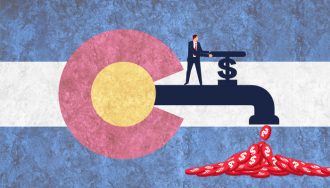 DraftKings to Open New Sports Betting Venue in ColumbusRead Article
DraftKings to Open New Sports Betting Venue in ColumbusRead Article Amelia WalkerMay 08, 2024
Amelia WalkerMay 08, 2024
According to recent reports, Illinois Governor J.B. Pritzker has proposed a $52.7 billion spending plan for the upcoming fiscal year starting July 1. He is aiming to cover a 2 percent spending increase partially through increased taxes on sportsbook operators. The governor, a billionaire in his second term, highlighted the need for additional revenue streams to support the state’s financial needs.
Illinois offers access to both in-person and online sports betting, and the proposal targets operators in this growing industry. In 2023, bettors in the state wagered $11.6 billion across eleven physical locations and eight online platforms, resulting in around $1 billion in gross gaming revenue for sportsbooks. From this revenue, the state’s share amounted to roughly $150 million.
Pritzker is proposing a significant increase in the tax rate on sports betting revenue. He is looking at raising the tax from the current 15 percent to 35 percent. If in place, this 35 percent rate could have generated an additional $200 million in tax revenue in 2023. If implemented, this tax rate would rank among the highest in the nation, coming close to Pennsylvania’s 36 percent sports betting tax rate.
The reason behind this proposal is to secure a bigger share of the revenue generated from the sports betting industry for the state. The governor has highlighted a number of projects toward which increased funding would go.
Under his plans, a portion of the increased revenue for the state would be used to address various state needs, including provisions for migrants relocated to Illinois from Texas. The governor intends to allocate $182 million for migrant welcome centers, housing coordination, and legal services. He said:
Listen, maybe some of you think we should just say, ‘This is not our problem,’ and that we should let the migrant families starve or freeze to death. But that’s not what decent Midwesterners do. That’s not what leaders do.
He went on to state that they didn’t ask for the “manufactured” crisis, but that they must still deal with it.
In addition, he plans to invest $500 million in expanding Illinois’ quantum computing industry and establishing a cryogenics facility.
The governor’s projections for the upcoming fiscal year indicate a 1.5 percent increase in state revenues, totaling nearly $53 billion. This boost stems from an estimated $800 million in tax increases targeting large businesses.
Governor Pritzker has a history of turning to the gambling sector to bring more money into state finances. In 2019, he led a gaming expansion package that included authorization for an integrated casino resort in downtown Chicago and five smaller regional casinos in the city’s south suburbs.
This legislation laid the groundwork for sports betting, and significantly boosted the Illinois gaming industry, nearly doubling its size – something that certainly helped the state’s finances.
The push for expanded gambling opportunities in Illinois followed a landmark decision by the US Supreme Court, which overturned a federal law restricting single-game sports betting to Nevada.
 DraftKings to Open New Sports Betting Venue in ColumbusRead Article
DraftKings to Open New Sports Betting Venue in ColumbusRead Article Amelia WalkerMay 08, 2024
Amelia WalkerMay 08, 2024 Colorado Could Increase Gambling Tax Allocated to Water ProjectsRead Article
Colorado Could Increase Gambling Tax Allocated to Water ProjectsRead Article Amelia WalkerMay 06, 2024
Amelia WalkerMay 06, 2024 Deceptive Promotions Lead to Legal Actions Against DraftKingsRead Article
Deceptive Promotions Lead to Legal Actions Against DraftKingsRead Article Lisa SpencerMay 04, 2024
Lisa SpencerMay 04, 2024